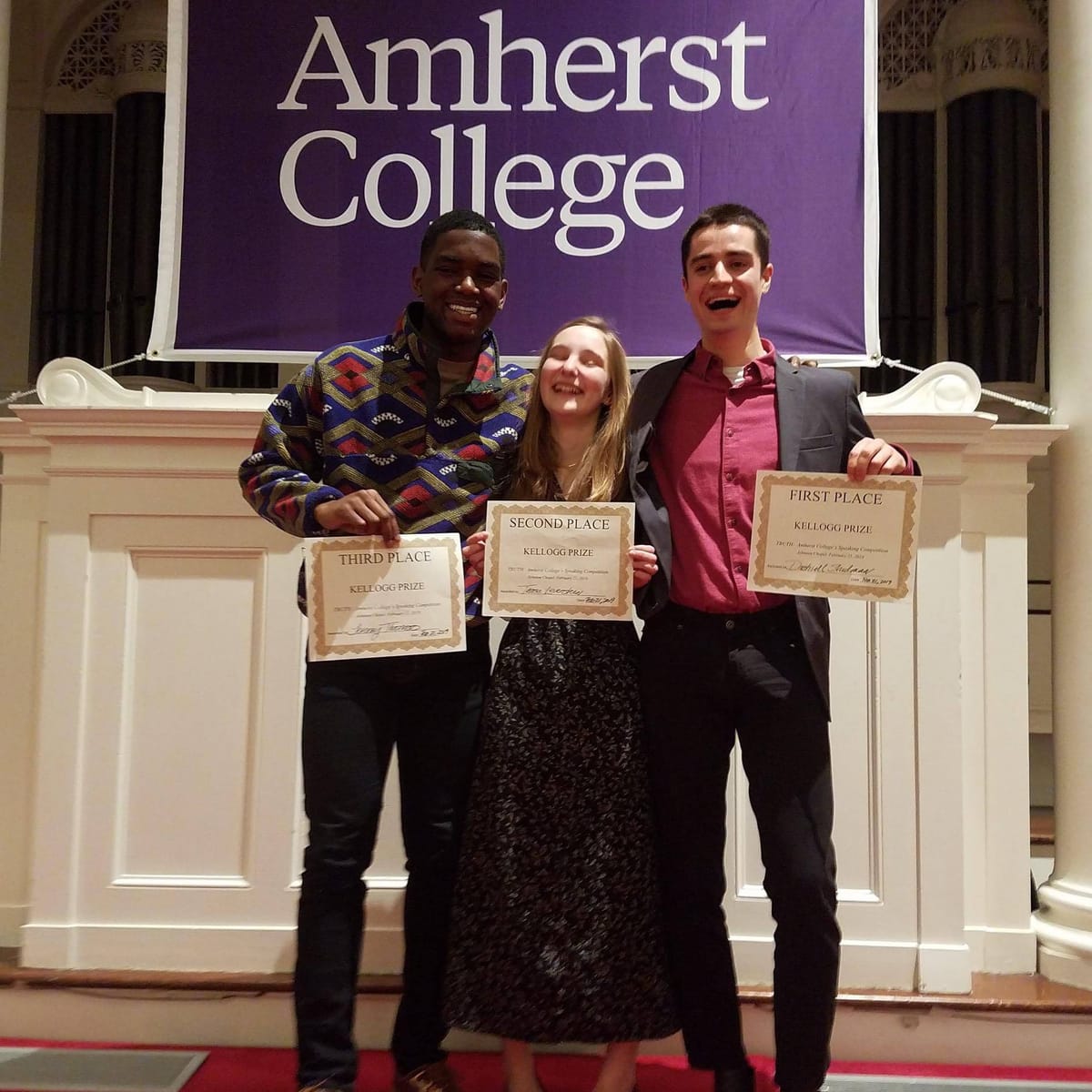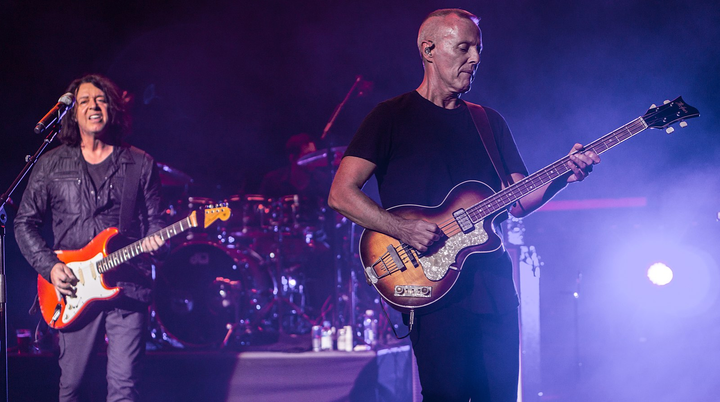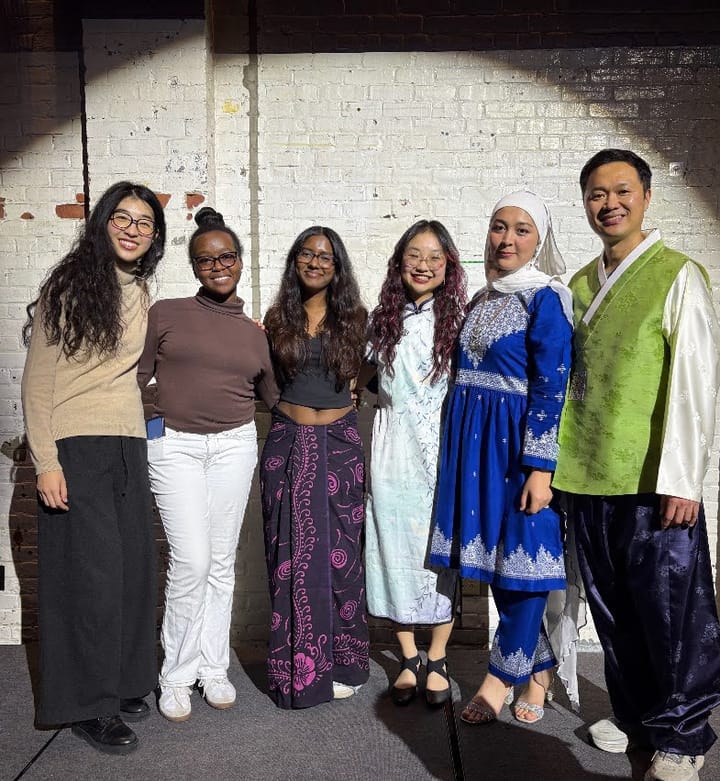Students Tackle Meaning of Truth In Speaking Contest

Truth: it is a concept that seems so simple, but is so difficult to find, believe and explain. Yet on Thursday, Feb. 21, 10 Amherst students stood in front of a crowd of peers and faculty judges and did just that; they found their truths, believed them and explained them confidently and passionately. Back in December, 31 students submitted their proposals for an oration on the concept of truth. The top 10 were chosen to stand on a stage and share their knowledge. The fact that this was a competition and the top three would be rewarded for their effort was a nice bonus.
Each of the 10 participants spoke on their interpretation of truth — interpretations that they conceived of mostly through their experiences as students and as citizens. For Jeremy Thomas ’21, truth was revealed to him when, in a Washington D.C. prison, he realized that “people are so much more than their worst deeds.” His truth is rooted in the common humanity of all people and in the power of thoughts in shaping the world. Megan Root ’19 did not venture as far as Thomas, but instead found her truth on campus when she practiced what many professors preach: critical thinking. Root realized there is no one truth because everyone understands the world only through the unique complexities of their own perspective, but that’s okay. You cannot see through someone else’s truth, but you can appreciate the value of it.
Konstantin Larin ’21 was inspired by the tumultuous state of world politics and highlighted the power of truth in promoting individualistic, and sometimes negative, agendas. He warns that “a fact-check will always be slower than the story itself,” and we should instead “narrative check.” We should consider the narrative any story strives to promote and not rely on our gut feeling. Ahliaa Moore ’21 brought her topic back home to Amherst, only to encourage us to go abroad. Truth, as Moore interprets it, “is not just a single set of facts. Truth is shaped by what we see.” Going abroad gives us the opportunity to live in the worlds of different people, see what they see and find new truths to add onto our own. The best part, according to Moore, going abroad does not always entail getting on a plane; it can mean whatever we want it to.
For Lauren Lamb ’21, the truth is that “people are hard to know.” Lamb’s interpretation deals with the superficial truths each person chooses to expose, and the deeper ones they hide out of fear of vulnerability. People have become comfortable only giving and accepting superficial versions of one another, something Lamb blames on the fact that “no one bothers to ask [about the deeper truths] and no one bothers to listen.” Cole Graber-Mitchell ’22 took a different approach. His conception of truth is that of a powerful weapon of confusion against which society is constantly struggling because, as he explains, “we do not have the language to talk about misleading statements.” The use of truth can be dangerous, and Graber-Mitchell believes the only way to combat this is to “hold ourselves to a higher standard.”
In keeping with the preoccupation of a better society, Tessa Levenstein ’22 found that the truth marketed by the American discourse on success is not as stable as it paints itself to be. The real truth is that “the American system punishes people who are not able to or choose not to go to college.” Americans, Levenstein believes, need something to unite them while they are still young, enthusiastic and curious. For Levenstein, these are enforced civil society programs after high school that will allow young people to better navigate life during the transition from childhood to adulthood. Gregory Kaplan’s ’21 idea for a better life experience is the truth revealed to him by a friend: “I will do better in the future.” But the only way to do better, as a society and not just as individuals, is to promote the good, honest truth — Abe Lincoln style. People need not lose their audacity by concealing their own truths with polite lies.
Silvia Huang’s ’22 truth is an amendment to the advice everyone receives at some point in their life: “be true to yourself.” For Huang, the truth is that “being yourself is never set in stone.” There are moments when you will have to compromise for the sake of healthier interactions. Finally, Dashiell Shulman’s ’20 conceptualization is one most people would not envision themselves, but would agree with in a heartbeat. “The truth is something physical; something you feel in your bones. And no amount of facts can stand up to it,” he said.
Once all 10 students spoke, Professors Mara Bollard of Philosophy, Darryl Harper of Music and Leah Schmalzbauer of American Studies and Sociology had the unenviable task of choosing the top three contestants. Ultimately, Thomas took third and Levenstein second while first place was awarded to Shulman. Nonetheless, all 10 of the competitors masterfully encapsulated the complexities of truth and left the audience searching for ways in which to describe our own truths.





Comments ()